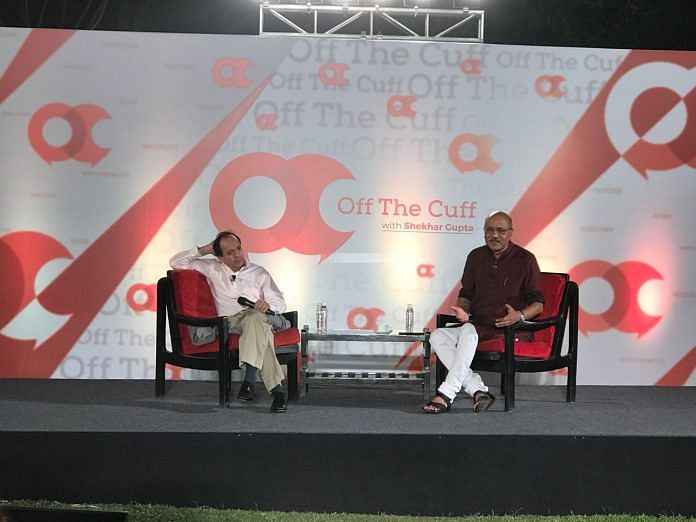Author hails SC judgment on the right to privacy, especially the part that says sexual orientation is an essential attribute of privacy.
Panaji: “Who wants to glorify homosexuality or heterosexuality? They just want to live their lives quietly.”
That was the message from acclaimed author and poet Vikram Seth, as he spoke at length about the intrusive and insensitive approach that the legislature and the judiciary have adopted towards a person’s sexual preferences.
Seth was in conversation with ThePrint’s Editor-in-Chief Shekhar Gupta at Off the Cuff in Goa Saturday, the first in the state. Seth engaged with the audience on sexuality and gender, and how while society had begun opening its doors, there were still several people who were trying to try to slam it shut.
Seth said he was a very private person and did not talk freely about homosexuality. But he added: “I am in a fairly comfortable position, though I did have a hard time understanding myself. Part of it was because of the prejudice against it. There is a lot of suffering involved; in small towns and villages, in metropolitan cities, even in a liberal family like my own, I found it difficult to understand myself. It was comparatively easy for me compared to those who are in service; they may even lose their livelihood. I only wished they would come out.”
But he did have a sharp comment to offer on those who claim they can “cure” homosexuality. “‘Yoga and Capitalist’ Baba had once said, ‘put me in a room with a lesbian and I will cure her’. Seriously, I am shocked,” he said.
On privacy
“Sexuality,” Seth said, “is a private sphere. I feel that aspect of privacy is wonderful. The inability to talk about it is unfortunate, and also not being able to talk about relations between men and women. I think it is something that needs to be opened up.”
Seth applauded the recent Supreme Court judgment on the right to privacy. “It was one of the most amazing judgments that we have seen in our country. It means we have the freedom to speak and think as we like without fear, with clarity and a wide sense of what privacy means,” said Seth, son of the late Leila Seth, India’s first woman chief justice of a high court.
“It is now seen as a fundamental right that the government or any party can’t bully us, and we own the right to our private lives.”
Seth was amazed at the stand taken by the judiciary, in particular the judgment of Justice D.Y. Chandrachud in the right to privacy ruling. The judge had said “sexual orientation is an essential attribute of privacy”, and that “equality (Article 14) demands that the sexual orientation of each individual in society must be protected on an even platform. The right to privacy and the protection of sexual orientation lie at the core of fundamental rights guaranteed by the Constitution of India.”
On Indians opening up
Seth said Indians have been closeted when it comes to talking about sex and sexuality. “Indians are so prudish that they have problems talking about heterosexuality. This, from a country that had the Kama Sutra,” he remarked.
“Indians in the last 150 years have found it very difficult to talk about any kind of sexual preferences. Even in the private zone, people shy away from that. I also think that people want to remain warm at night, but they are lonely.”
When asked about the #MeToo campaign and the fact that there has been a quiet acceptance of this in Indian families, he said he does see a change in the scenario. “As people get a wider sense of what is happening, despite their previous take on the situation, eventually logic breaks through and I hope there is a change taking place. The younger people have clearer views, and this affects legislators and judges and the ordinary person,” he said.
Worrying prejudices
Seth also said there were two kinds of prejudices in Indian society that worried him a lot – religious prejudice, and prejudice against tribals.
About the first, he said he was concerned that there were politicians who wanted to use these prejudices to their advantage, and that anyone who discriminated on the basis of food, religion or the person one loved “was not worthy of being an Indian leader”.
On the rights of tribals, he said these people were being silenced, denied their right to express their opinions, or even vote, and that it was a matter of great concern.




